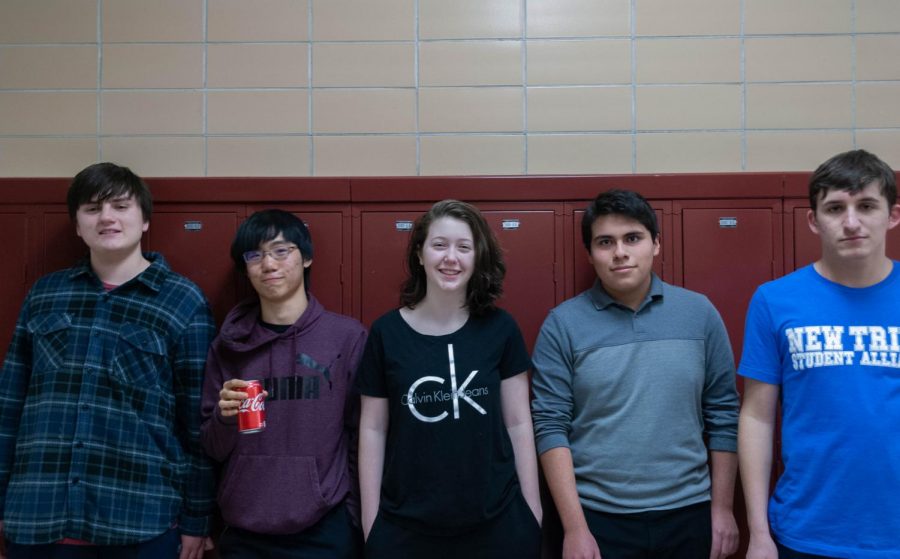Right-leaning students claim political bias at NT
Questions arise over whether political beliefs affect grades
While many students feel political discussion in the classroom remains neutral despite partisan tensions, some right-leaning students believe civil discourse in school is not handled fairly.
Because of perceived social pressures from liberal peers and teachers, some conservative students are fearful to contribute to political discussions.
Sophomore Antigone Zervas, member of the Trevian Republican club, agreed and feels prejudice against conservatives in the classroom exists.
“I feel that there is a stigma against people that have different beliefs from the majority. It doesn’t produce a healthy environment for everyone to have a discussion,” said Zervas. “In school, or this climate in general, we can’t have conversations with opposing viewpoints.”
Though the majority of students have no issues with how teachers handle controversial topics, discrepancies exist depending on party affiliations. Left-leaning or moderate students found fewer problems with teachers’ conduct surrounding civil discourse, while right-leaning students took issue.
Junior Charlotte Cleary who identifies as independent, said “I think my teachers might sometimes have a slight bias towards the democratic side, but they try to be as equal as possible and respect everyone’s opinions,” Cleary said.
Similarly, junior Daniel Austen, Club Head for the Young Democrats, agreed that the school environment is fair and that teachers approach civil discourse appropriately.
“I think teachers are very good at trying to hide biases and being fair to all students. I feel like it’s a really open and safe space,” said Austen.
Conservative students, though, were more critical of how teachers had handled political discussion.
“I think NT is a ‘safe space’ only because people are afraid to talk about their ideas because of their fear of offending someone,” said Frank Zawrazky, President for the Trevian Republicans.
Zawrazky described his political beliefs as an occasional “hindrance” to his academic experience.“My political beliefs have affected my experience in school to the point where certain teachers will take off points for conservative views when it’s a very subjective assignment about politics. It’s happened to me on more than one more occasion,” Zawrazky said.
English teacher Jay Rosenberg felt discussing controversial issues should be an opportunity to encourage critical thinking and growth in students. He acknowledged that while creating robust dialogue, a teacher’s actions can be misunderstood.
“My tendency is to always present a viewpoint that isn’t represented by the students. How they interpret that is out of my hands,” explained Rosenberg. “Just because a teacher challenges your position in an essay, it doesn’t mean that teacher disagrees with you. It means the teacher is trying to get you to think more critically and comprehensively.”
Social studies teacher Kerry Hall agreed that it’s crucial to make sure students consider a controversial topic from all sides.
When it comes to teachers remaining unbiased, Hall said “I think it’s harder these days, but it’s a good goal to have.”
Political debate in class can often heighten emotions and evoke different reactions from students, but according to Hall, debate generally remains civil.
“Sometimes I’ll see eyes rolling during a discussion, but the student making the comment doesn’t see the eyes rolling. Most of the time it’s a respectful disagreement. In the classroom I will surely defend someone’s right to have a view that’s the minority view,” said Hall.
In parallel, the 2017 Seminar Day on race sparked debate about political bias in school and whether students are being exposed to multiple perspectives.
However, The NT Neighbors is a community organization of parents whose main focus is, “building community through common sense, free enterprise, and the Golden Rule,” and, “vigorous honest discussion on the merits of issues,” according to their mission statement.
NT Neighbors board member Jonathan Towers said that this issue of conservative students feeling a lack of acceptance pertains to the educational goals of New Trier.
“We try to look at it as hypothetical college admission officers. Are students being prepared for robust political dialogue in the future?” Towers said. “All students should feel unafraid and safe in whatever their opinion is.”
Former candidate for state senate and NT parent Joan Lasonde agreed that creating engaged discussion is critical for the academic and mental growth of students.
“I have heard that some students are afraid to speak up because then they’re called a racist or other things. If there are kids who are afraid to say what they think, I guess NT is not doing enough to promote this dialogue,” said Lasonde.
Peter Tragos, the Assistant Superintendent for Curriculum and Instruction, believes balanced civil discourse is critical.
“We met with several students at
the end of last year. They were self-identified conservative thinkers,” explained Tragos.
“Some expressed concerns. They felt like they were not as heard, not just by teachers but by students.”
Tragos explained that the administration expects controversial issues to be age appropriate, serve an educational purpose, be consistent with the curriculum, and present a balanced view per school board policy.
“Presenting difficult issues is important, but it needs to be done in a way that engages and inspires students rather than shutting them down. Our work has been around creating and developing the skills [teachers need] to do this,” said Tragos.
While the administration has facilitated discussion among conservative students, Zawrazky encouraged all students to have conversations with those they disagree with.
“We want people to talk with us because that dispels the stigma around conservative viewpoints. Conservatives don’t bite,” joked Zawrazky. “There has to be open dialogue and there is not enough of that happening.”







































